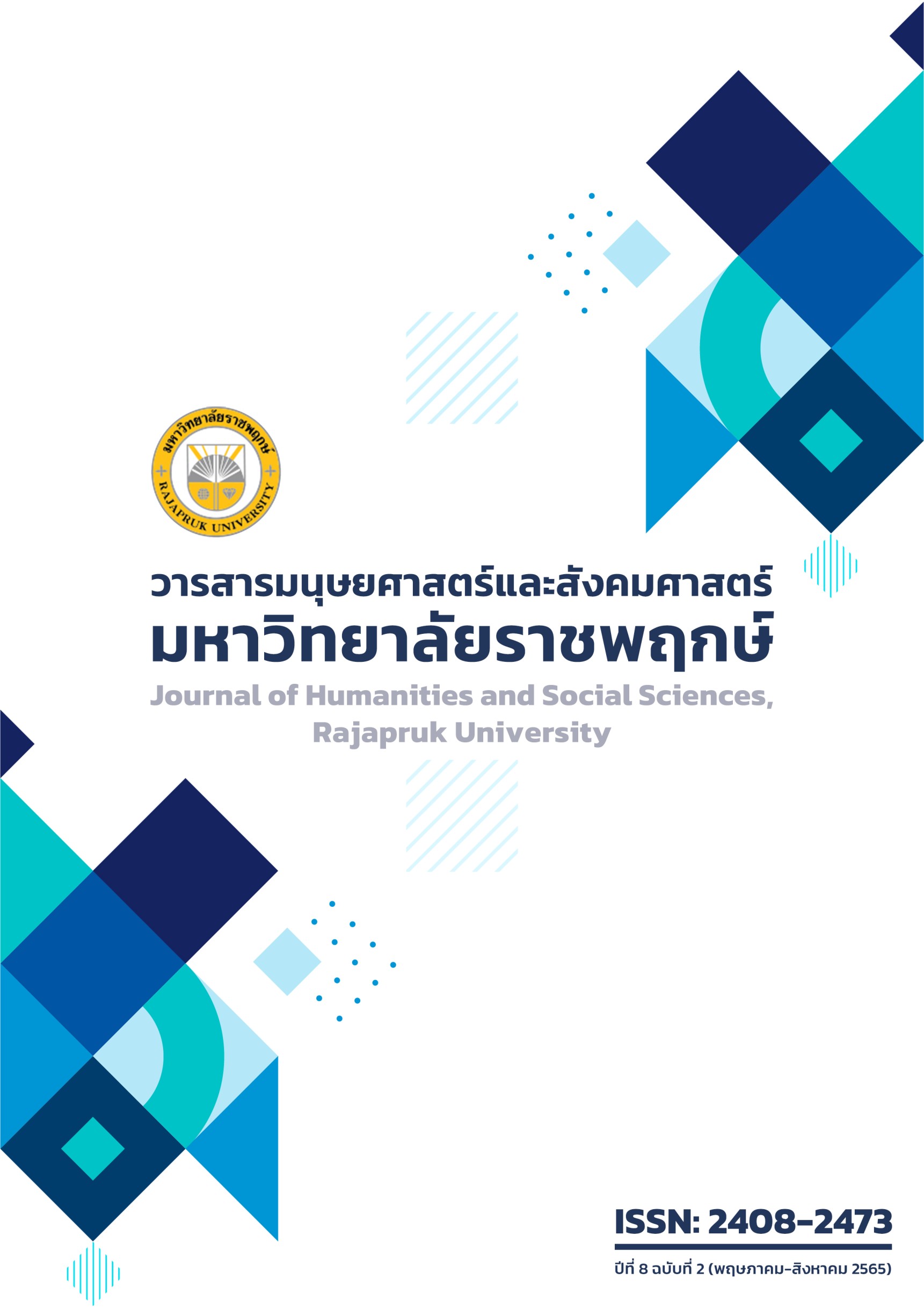Evaluation of Work-integrated Learning with Internship and Cooperative Education of Student in Rajapruk University
Main Article Content
Abstract
The purposes of this research study were 1) to study the opinion of internship and cooperative students at Rajapruek University, 2) to study the opinion of Work-integrated Learning students at Rajapruek University, and 3) to compare the level of the opinion of internship, cooperative, and Work-integrated Learning students in Rajapruek University. The samples were the students who studied in internship, cooperative, and Working-integrated Learning course in Rajapruek University, which contained 295 samples, with purposive sampling method. All samples were selected. The instrument of this research study was a questionnaire. Data were analyzed by frequency, percentage, mean, standard deviation, t-test, and F-test (One–Way ANOVA). The results showed that most respondents had expectations of integrating their study with work: To gain practical experience during the doing internship and There were mentors in the workplace. These mentors were someone who had appointed at the workplace and will support you at your work to achieve the integration of study and work. Lastly, most respondent were receiving information about the WiL course clearly. For evaluating the feedback on the internship, the respondents were overall at a high level. Consideration for each aspect, the key main challenges in working with learning were overall picture at a high level and there is a critical attitude based on the experience of total quality at a high level. For testing hypothesis, the difference in faculties to which students are studying and types of internships differed the several challenges working with learning at the level .05 of significant. Finally, gender and workplace of the respondents did not differ in the feeling with WiL internships, the several challenges working with learning and attitudes associated with experiential learning at the level .05 of significant.
Article Details
References
ประดินันท์ ประดับศิลป์ และ ลักษณา เกตุเตียน. (2558). จรรยาบรรณวิชาชีพของผู้ทำบัญชีที่ปฏิบัติงานในสำนักงานบัญชีในเขตกรุงเทพมหานครต่อการจัดทำบัญชีและนำเสนองบการเงินที่อยู่นอกตลาดหลักทรัพย์แห่งประเทศไทย. รายงานงานวิจัย มหาวิทยาลัยธุรกิจบัณฑิตย์.
แผนอุดมศึกษาระยะ 20 ปี พ.ศ.2561-2580. ค้นเมื่อวันที่ 30 พฤศจิกายน 2562, จาก. http://www.mua.go.th/users/bpp/main/download/plan/plan20yrs.pdf.
วิจิตร ศรีสอ้าน. (2562). ปาฐกถาพิเศษเรื่อง “นวัตกรรมสหกิจศึกษา 4.0”. ค้นเมื่อวันที่ 28 พฤศจิกายน 2562, จาก https://www.wu.ac.th/th/news/10869.
สำนักงานคณะกรรมการการอุดมศึกษา. (2561). แผนอุดมศึกษาระยะยาว 20 ปี พ.ศ.2561-2580. ค้นเมื่อวันที่ 18 กันยายน 2563, จาก http://www.bpp.mua.go.th/main/download/plan/%E0%B9%81%E0%B8%9C%E0%B8%99%E0%B8%AD%E0%B8%B8%E0%B8%94%E0%B8%A1%E0%B8%A8%E0%B8%B6%E0%B8%81%E0%B8%A9%E0%B8%B2%E0%B8%A3%E0%B8%B0%E0%B8%A2%E0%B8%B0%E0%B8%A2%E0%B8%B2%E0%B8%A7%2020%20%E0%B8%9B%E0%B8%B5%20(%E0%B8%9E.%E0%B8%A8.%202561-2580).pdf
สำนักงานเลขาธิการสภาการศึกษา กระทรวงศึกษาธิการ. (2552). การพัฒนาแนวทางการจัดการเรียน การสอนที่บูรณาการการเรียนรู้กับการทำงาน (Work-Integrated Learning). กรุงเทพฯ: สำนักงานเลขาธิการสภาการศึกษา
อลงกต ยะไวทย์ และคณะ. (2558). การศึกษารูปแบบการจัดการเรียนการสอนเชิงบูรณาการกับการทำงานในสถาบันอุดมศึกษาที่เหมาะสมกับกลุ่มสาขาวิชาชีพของประเทศไทยระยะที่ 1 เฉพาะกลุ่มสาขาวิชาวิศวกรรมศาสตร์และกลุ่มสาขาวิชาบริหารธุรกิจพาณิชยศาสตร์ บัญชี การจัดการการท่องเที่ยว และเศรษฐศาสตร์. กรุงเทพฯ: สำนักงานคณะกรรมการการอุดมศึกษา.
Alderman B. & Milne P. (2005). A model for work-based learning. Lanham, MD: Scarecrow Press; p. 200.
Brew, L., & Kottler, J. A. (2007). Applied helping skills: Transforming lives. Thousand Oaks, CA: Sage.
Kolb, A. Y., & Kolb, D. A. (2005). Learning styles and learning spaces: Enhancing experiential learning in higher education. Academy of Management Learning & Education, 4(2), 193-212.
Kramer, M. and Usher, A. (2011). Work-Integrated Learning and Career-Ready Students: Examining the Evidence. Toronto: Higher Education Strategy Associates.
Linford, D., & Marshall, J. (2014). Mentorship from the student perspective. The Practicing Midwife, 17(11), 33-36.
Stirling, A., Kerr, G., Banwell, J., MacPherson, E., & Heron, A. (2016). A practical guide for work-integrated learning: Effective practices: Effective practices to enhance the educational quality of structured work experiences offered through colleges and universities. Ontario, Canada: Higher Education Quality Council of Ontario.
Swinburne University of Technology. (2012). Industry Engaged Learning: Industry-Based Learning. Retrieved on 5th September 2012, from; http://www.swinburne.edu.au/iel/programs/ibl/
University of North Texas. (2015). Take Flight Job Shadowing Program: 2015 Student Fact Sheet. Retrieved on 19th November 2019, from; from; http://studentaffairs.unt.edu/sites/default/files/pdf/2015%20Student%20Fact%20Sheet.pdf
University of Waterloo. (2012). What is Co-operative (co-op) Education. Retrieved on 19th November 2019, from; https://uwaterloo.ca/co-operative-education/about-co-operativeeducation


